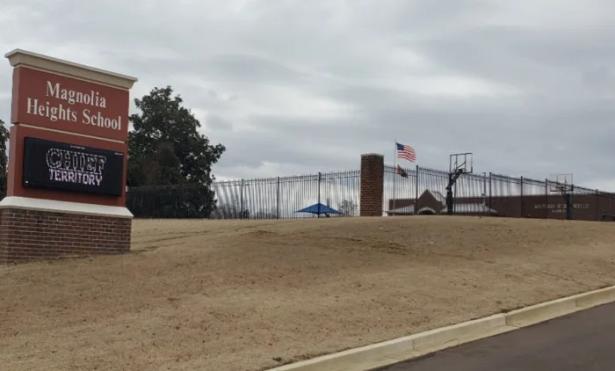Sometimes you just have to go see for yourself. Sure enough, after a three-hour drive from Jackson in overcast conditions with a few sprinkles, there it was at the height of a hill, 1 Chiefs Drive in Senatobia – Chief Country – the K–12 private school named Magnolia Heights School. Other names besides private exist, like independent and preparatory, yet the most authentic is segregation academies. At one time there were 57 of these academies in Mississippi, six of those are now closed, per https://enwikipedia.org/wiki/Segregation_academy.
Per www.magnoliaheights.com they’ve been in business since the 1970-71 school year with initial enrollment of 225 students. The school’s history page on the website begins with this sentence: “Magnolia Heights School was the dream of a group of citizens who felt the need for alternative education in the Tate County area for any child interested in a college preparatory education,” as if public schools don’t do the same. State Representative John Thomas “Trey” Lamar III is not only a graduate, but currently serves as Vice President of Magnolia Heights Board of Trustees. Lamar (R-08 Lafayette & Tate) since 2012, is also chairman of the lower chamber Ways and Means committee and has drafted legislation to funnel federal funds through the state to private schools; HB1663 to name just one.
Rep.John Thomas Lamar, III, from www.legislature.ms.gov.
Keeping their white kids segregated from black kids is always their version of “alternative education” despite the laws against it and the conscience of the nation. The Brown v. Board of Education decision was handed down by the U.S. Supreme Court in 1954, mandating public school desegregation – no more separate but equal shenanigans. In the 1976 Runyon v. McCrary decision, the U.S. Supreme Court ruled that private schools that discriminate on the basis of race or establish racial segregation are in violation of federal law.
Today, Magnolia Heights School has an enrollment of 695 students according to a lady in their office during this writer’s February 8, 2024, visit. I was told a lady named Jacqueline would have answers to my questions about enrollment and demographics of enrollment. I left my card and received assurances I would hear from her, but that didn’t happen as we went to press a week later. Perhaps it was use of the word, demographics? Their website indicates they have 64 teachers – 100% of the faces look white. They have this rotating photograph thingy on the home page, I count 63 faces all total, 61 one of them are white faces. Another page spoke about their National Honor Society inducting 25 new members, the photo has 50 faces total, 49 out of 50 are white faces.
Looking back, “from the mid-1960s to 1980, as public schools in the Deep South began to slowly desegregate through federal court orders, private school enrollment increased by more than 200,000 students across the region—with about two-thirds of that growth occurring in six states: Alabama, Georgia, Louisiana, Mississippi, North Carolina, and South Carolina. During this time, the Internal Revenue Service (IRS) vacillated in its allowance of tax deductions for private schools…leading to a Mississippi-based lawsuit against the IRS in 1969 in which federal courts issued a preliminary injunction denying exemption to private schools that were segregated by race. Following this court order, the IRS adopted a non-discrimination policy applying to private schools in 1970, though it took eight years to be implemented,” per https://southerneducation.org
Nancy Loome, executive director of the Parents Campaign, a public-school advocacy group, told Mississippi Today in April 2022, “During and following integration in the 60s and 70s, lawmakers diverted much-needed funding and resources away from public schools and into private segregation academies,” she said. “It was wrong then, and it is wrong today. The public’s funds belong in the public’s schools, and our constitution makes that plain.“
In October 2022, Hinds County Chancery Court Judge Crystal Wise Martin blocked a state law that put $10 million of federal pandemic relief money into infrastructure grants for private schools. On February 6, 2024, a three-judge panel of the Mississippi Supreme Court led by Justice Leslie King heard oral arguments and a ruling is pending.
Mississippi’s residents pay dearly in a multitude of ways for not prioritizing public education and its funding. We are currently ranked #49 overall by https://worldpopulationreview.org and others. We passed a law in 1997 for Mississippi Adequate Education Program but haven’t followed it in 15 years. This state fought against the equitable funding sought for HBCU’s in the Ayers case for nearly 30 years. Too many wrongheaded people elect wrongheaded leadership, and we suffer and remain at the bottom.
Using personal funds to support one’s alma mater happens on the daily, but folks like Representative John Thomas Lamar III, just 43 years old and a former law clerk in the Office of Governor Haley Barbour, well, they go about it differently – like a cowpuncher heaving a lasso around the necks of all Mississippi taxpayers to pony-up the desired funds for their alma mater and other segregation academies who already receive exorbitant tax-credits. Do you suppose it is a coincidence that it was Representative Lamar who authored HB1020 – aka Jim Crow 2.0 - the blatant abruption of black power in our 80+% Black City? He received his training at Magnolia Heights School, where the website is overflowing with words, with the exception of these three - Black History Month.



Spread the word